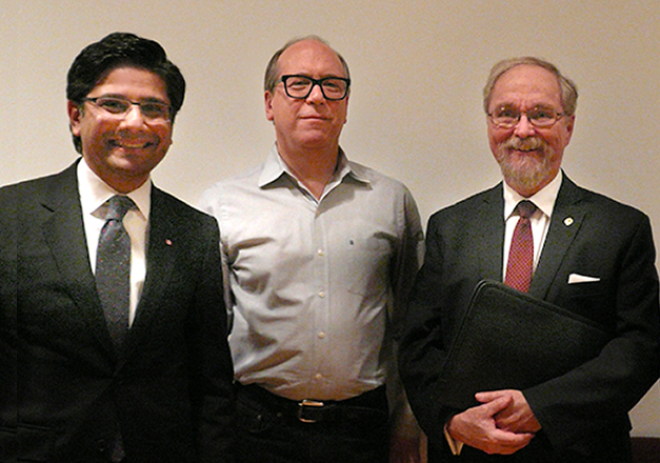HERITAGE OTTAWA
The controversial Ontario Municipal Board (OMB) is about to be replaced by the Local Planning Appeal Tribunal.
The new Tribunal follows the government of Ontario's passage of Bill 139 on December 12, 2017. Applications completed before December 12 will be heard by the OMB. Applications completed after December 12 will be heard by the new Tribunal, which comes into effect on April 3, 2018.
More than 100 people gathered at the Ottawa Public Library last week to hear Attorney General Yasir Naqvi, community activist Jay Baltz, and lawyer and former OMB member Marc Denhez discuss longstanding problems with the OMB and its outdated framework, and how the Tribunal aims to improve local planning. Entitled OMB Reform: Getting Heritage Planning Right, the evening was part of Heritage Ottawa's annual free Lecture Series.
Marc Denhez— while pointing out that the term "planning" has never been properly defined— emphasized that a planning system is only as good as its criteria, that the system suffers from lack of public buy-in, and that it's plagued by chronic uncertainty and economics. He also targeted the OMB's history of bias toward developers, having seen communitiy members referred to not only as NIMBIES but as BANANAS—"Build Absolutely Nothing Anywhere Near Anything".
Jay Baltz cited the prohibitively high costs of OMB challenges to many communities, and concerns for the extent of funding that municipal councillors receive from developers.
Attorney General of Ontario Yasir Naqvi has been involved with the reforms to Ontario's land-use planning appeals system and worked on the recent legislation. He described the new Tribunal's four major objectives:
1. To create greater certainty for residents, communities, and developers by exempting a broader range of major land-use planning decisions from appeal, including new Official Plans (OP), major OP updates, and detailed plans to support growth in major transit areas.
2. To give communities a stronger voice in development by affording greater weight to the decisions of local communities and governments, while ensuring that development and growth occurs in a manner beneficial for Ontario and its future. The new tribunal can overturn a municipal decision only if the decision does not follow provincial and local plans or policies.
3. To help ensure faster, fairer and more affordable hearings by establishing clear timelines for pre-hearing and hearing processes so that people can get a better sense of when the tribunal would hear their case, and how long the process is going to take.
4. The creation of a new, independent agency called the Local Planning Appeal Support Centre, to provide free legal and planning advice and representation to communities throughout the appeal process.
Creation of the new Tribunal intended to improve the process by making appeals more predictable, less costly, and allowing for more community-inspired development.
Presentations by the three speakers were followed by a spirited question-and-answer session. It was remarked that the new Tribunal is only an incremental improvement in Ontario's planning framework, which is out of date, allowed excessive growth, and does not work in the best interests of the very communities that it is intended to serve. Creation of the new Tribunal does not, in fact, address planning issues related to the Ontario Heritage Act and the Provincial Policy Statement.
Heritage Ottawa thanks Attorney General Yasir Naqvi, Jay Baltz and Marc Denhez for their public service and dedication in working towards a better system.
While we appreciate that the Tribunal represents an improvement, more work remains to be done.
Heritage Ottawa looks forward to additional planning reforms in support of greater heritage protection and sustainability.
